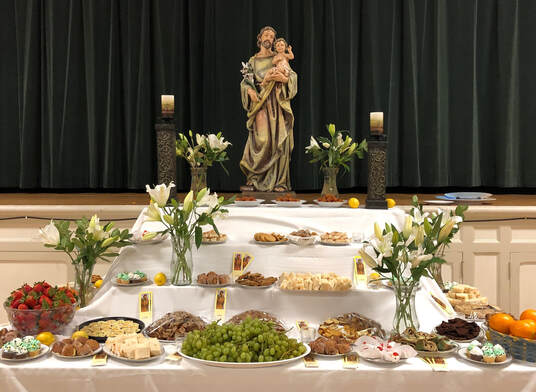 Our "St. Joseph's Table" in 2018.
Our "St. Joseph's Table" in 2018. St. Joseph is called “hope for the sick.” Now, you could say that about all saints, because they all bring God’s “salvation” (from the Latin salus, or “health”) to an infected world. The name “Jesus” means “God saves,” or “God makes whole,” “God makes healthy.” The saints provide Jesus to us, that is, they provide “health.” Our Lady is called “health of the sick,” and her husband is called “hope of the sick.” The mother brings health to her child (tenderly cleaning a skinned knee), while the father gives hope by reassuring his child that “Mamma will fix it all up for you.” We need both the steady support of our fathers and the skillful healing hands of our mothers.
Fr. Calloway relates the charming story of Zelie Martin, the mother of St. Therese of Lisieux. While still a nursing baby, Therese became deathly sick. Her mother knelt prayed to St. Joseph. “I do not often cry, but I was crying as I prayed,” she writes. The baby rallied a bit, but then stopped breathing. “She was so calm, so peaceful, that I thanked God for having her die so gently,” Zelie wrote. But after a quarter of an hour, “my little Therese opened her eyes and started to smile.” Therese, as we all know, smiled for the rest of her life, even during her final illness at age 24. She continues to smile from heaven, showering us with roses from God’s storehouses of grace. Smiling in the thick of physical illness is true health.
On page 203, Fr. Calloway describes half a dozen Catholic devotional traditions to St. Joseph for health, such as “St. Joseph’s table” and St. Joseph’s Mass on Wednesdays.


 RSS Feed
RSS Feed